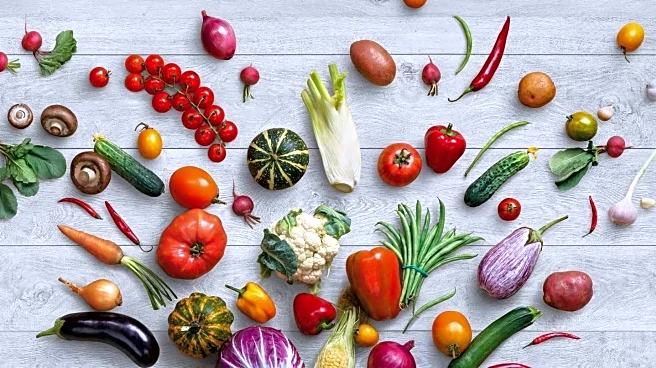What's Happening?
Les Dames d'Escoffier International, a philanthropic organization of women leaders in the food, beverage, and hospitality industries, has shared insights into upcoming food trends for Fall 2025. The organization, which started in New York City in 1976, now comprises 40 chapters across several countries, including the United States. Members predict a focus on global flavors, functional ingredients, and sustainable practices. Asian-inspired dishes and plant-based options are expected to rise in popularity. Additionally, tariffs imposed by the Trump Administration on imports from the EU are anticipated to affect the pricing of specialty products, potentially impacting menu items due to increased supply costs. Sustainability remains a key trend, with chefs and producers emphasizing environmentally friendly practices and ingredients.
Why It's Important?
The insights from Les Dames d'Escoffier highlight significant shifts in consumer preferences and industry practices. The focus on sustainability reflects a growing demand for environmentally responsible food production, which could influence supply chains and restaurant operations. The impact of tariffs on imported goods underscores the interconnectedness of global trade and its effects on local markets. As tariffs increase costs, restaurants may need to adjust their offerings or pricing strategies, potentially affecting consumer access to diverse culinary experiences. These trends indicate a broader movement towards mindful consumption and the integration of cultural and environmental considerations in food choices.
What's Next?
As Fall 2025 approaches, restaurants and food producers may need to adapt to these emerging trends by sourcing sustainable ingredients and reevaluating their supply chains in light of tariff impacts. The emphasis on sustainability could lead to increased collaboration between chefs and local producers to ensure environmentally friendly practices. Additionally, the industry might see innovations in menu design and ingredient sourcing to mitigate the effects of rising costs due to tariffs. Stakeholders, including chefs, restaurateurs, and consumers, will likely continue to advocate for policies that support sustainable and accessible food options.
Beyond the Headlines
The focus on sustainability and tariffs in the food industry reflects broader societal shifts towards environmental consciousness and economic resilience. These trends may encourage further exploration of ethical and sustainable practices across other sectors, potentially influencing public policy and consumer behavior. The integration of cultural heritage in food experiences highlights the role of gastronomy in fostering community connections and cultural understanding, which could have long-term implications for social cohesion and cultural preservation.











